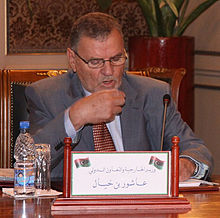According to polling results released on the anniversary of the outbreak of the revolution, one in three Libyans would rather have . . .[restrict]authoritarian rule than democracy.
At least, this is the headline conclusion raised over research conducted by Oxford University’s Institute of Human Sciences, working with private research organisation Oxford Research International and Benghazi University. The pollsters interviewed more than 2,000 Libyans during December and January.
The answers they received appeared to show that, despite widespread loathing for the Qaddafi regime, for the next five years at least, a third of Libyans would nevertheless feel more comfortable with strong rule from an authoritarian leadership.
Psychologists might argue that after more than four decades of dictatorship, the yearning for certainties, even if accompanied by repressive rule, is almost inevitable. Most Libyans have no experience of democratic government, the rule of law, transparency in public affairs or the existence of independent institutions.
Others might point out that despite the long dark decades of brutalisation, rather than focusing on the one third of the population who would welcome authoritarian rule, it should be seen as truly remarkable that fully two thirds of Libyans actually reject any return to it.
The survey went on to reveal that only 29 percent of respondents said that they would actually prefer to live in a democracy. This response appeared validated by the fact that only 27 percent said that they trusted political parties.
However the seeming clarity of this finding was almost immediately muddied by the revelation that 69 percent of all those questioned told the researchers that they were insistent that ordinary people should have a say in how Libya should develop. Troublingly however, the survey found from 16 percent of respondents that they were ready to resort to violence for political ends.
Nevertheless, the poll also revealed that Libyans are largely optimistic about the future, with 80 percent expecting improvements in their personal lives, economic circumstances and the country itself. The strongest opinion, 89 percent of those asked, was that the NTC was trustworthy.
Given the continuing presence of militias and the uncertainties their presence generate, the overwhelming endorsement of the NTC in the poll is probably significant. It might just help to persuade more militia members that their job is done and they should either join the police or regular army or return to their jobs and families. [/restrict]








